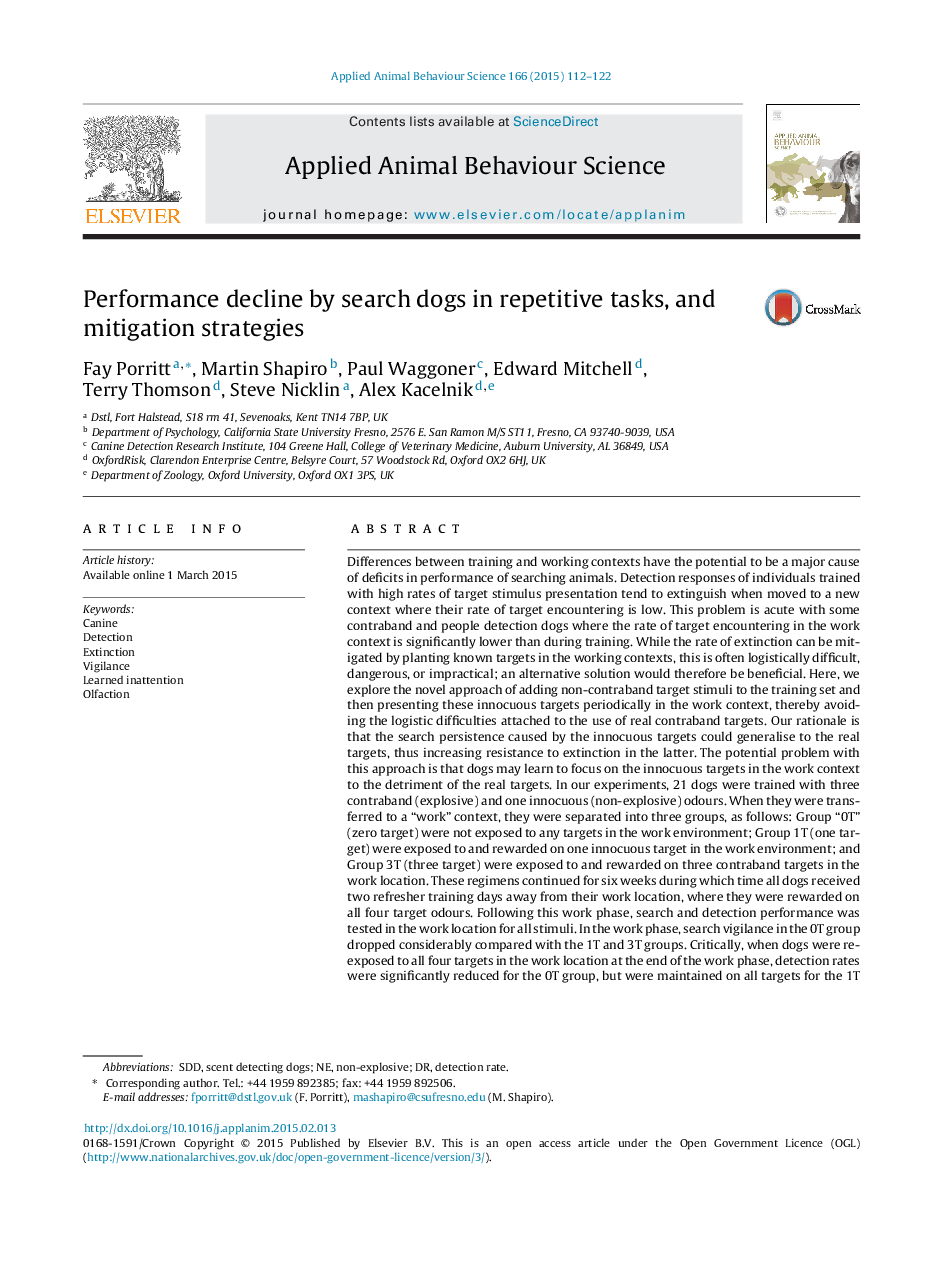| کد مقاله | کد نشریه | سال انتشار | مقاله انگلیسی | نسخه تمام متن |
|---|---|---|---|---|
| 6379600 | 1625340 | 2015 | 11 صفحه PDF | دانلود رایگان |
عنوان انگلیسی مقاله ISI
Performance decline by search dogs in repetitive tasks, and mitigation strategies
ترجمه فارسی عنوان
کاهش عملکرد توسط سگ های جستجو در وظایف تکراری و استراتژی های کاهش
دانلود مقاله + سفارش ترجمه
دانلود مقاله ISI انگلیسی
رایگان برای ایرانیان
کلمات کلیدی
موضوعات مرتبط
علوم زیستی و بیوفناوری
علوم کشاورزی و بیولوژیک
علوم دامی و جانورشناسی
چکیده انگلیسی
Differences between training and working contexts have the potential to be a major cause of deficits in performance of searching animals. Detection responses of individuals trained with high rates of target stimulus presentation tend to extinguish when moved to a new context where their rate of target encountering is low. This problem is acute with some contraband and people detection dogs where the rate of target encountering in the work context is significantly lower than during training. While the rate of extinction can be mitigated by planting known targets in the working contexts, this is often logistically difficult, dangerous, or impractical; an alternative solution would therefore be beneficial. Here, we explore the novel approach of adding non-contraband target stimuli to the training set and then presenting these innocuous targets periodically in the work context, thereby avoiding the logistic difficulties attached to the use of real contraband targets. Our rationale is that the search persistence caused by the innocuous targets could generalise to the real targets, thus increasing resistance to extinction in the latter. The potential problem with this approach is that dogs may learn to focus on the innocuous targets in the work context to the detriment of the real targets. In our experiments, 21 dogs were trained with three contraband (explosive) and one innocuous (non-explosive) odours. When they were transferred to a “work” context, they were separated into three groups, as follows: Group “0T” (zero target) were not exposed to any targets in the work environment; Group 1T (one target) were exposed to and rewarded on one innocuous target in the work environment; and Group 3T (three target) were exposed to and rewarded on three contraband targets in the work location. These regimens continued for six weeks during which time all dogs received two refresher training days away from their work location, where they were rewarded on all four target odours. Following this work phase, search and detection performance was tested in the work location for all stimuli. In the work phase, search vigilance in the 0T group dropped considerably compared with the 1T and 3T groups. Critically, when dogs were re-exposed to all four targets in the work location at the end of the work phase, detection rates were significantly reduced for the 0T group, but were maintained on all targets for the 1T and 3T group. Our results show that rewarding search persistence with innocuous stimuli is potentially a successful strategy to maintain detection-dog performance across a range of trained contraband odours.
ناشر
Database: Elsevier - ScienceDirect (ساینس دایرکت)
Journal: Applied Animal Behaviour Science - Volume 166, May 2015, Pages 112-122
Journal: Applied Animal Behaviour Science - Volume 166, May 2015, Pages 112-122
نویسندگان
Fay Porritt, Martin Shapiro, Paul Waggoner, Edward Mitchell, Terry Thomson, Steve Nicklin, Alex Kacelnik,
